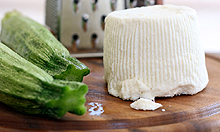Ricotta Nutrition Facts

Ricotta is a type of whey cheese, developed in Italy but manufactured and sold all over the world. Ricotta is a very flexible and delicious dairy product, starring in lasagna, cannoli, and many other delicious dishes which require the use of a soft, mild cheese product. The name, ricotta, actually means to cook again in Italian, a reference to the way in which ricotta is manufactured.
Ricotta, like other cheeses, varies according to the type of milk from which it is made, by the region or country in which it is produced, and by the process used in its production. In Italy, ricotta salta, which resembles feta, is made by salting and drying the curd. Ricotta infornata is a Sicilian variety that is baked. In northern Italy, ricotta is processed by smoking it. Goat’s milk ricotta made in Switzerland is called zieger, and in Greece manouri.
Ricotta has multiple health benefits that make it a great addition to your daily diet, states the website eHow.com:
Protein: One half cup serving of whole milk ricotta cheese has 14 g of protein. This is 28 percent of your daily value of protein, which will help to build muscle.
Calcium: Calcium is needed for strong bones, and is found in all dairy products. Ricotta cheese is no exception. A half cup serving has 257 mg of calcium, or 26 percent of your daily recommended value.
Omega Fatty Acids: Omega-3 and omega-6 fatty acids are known for helping to prevent heart disease and cancer, and are healthy for the body. Ricotta cheese has 139 mg of omega-3 fatty acids and 339 mg of omega-6 fatty acids per half cup serving.
Minerals: One half cup serving of ricotta is a great source of phosphorus (20%), zinc (10%) and selenium (26%).
Vitamins: One serving of ricotta cheese is a good source of vitamin A (11% daily value), riboflavin (14%) and vitamin B12 (7%).
|